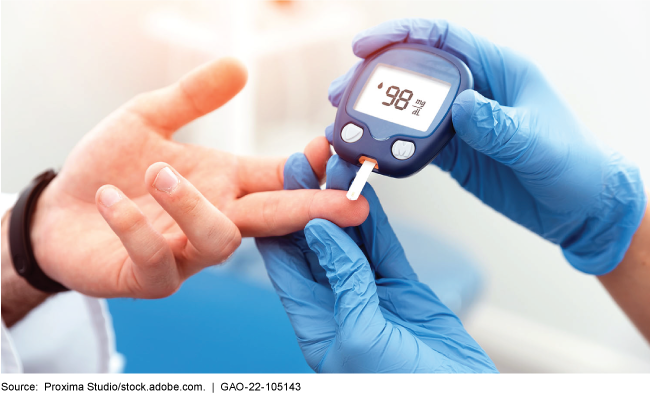Skip to main content
GAO-22-105143 Published: Feb 08, 2022. Publicly Released: Feb 08, 2022.
For disability claims, the Department of Veterans Affairs recognizes that Vietnam veterans' Type 2 diabetes can be related to wartime herbicide exposure (e.g., Agent Orange). But VA requires veterans to provide evidence supporting possible links to Type 1 diabetes.
How many Vietnam veterans have made disability claims for Type 1 diabetes—and how many has VA granted or denied?
It's hard to say. Some of them likely filed claims several decades ago. But VA's claims decision data only goes back to 2003. Also, VA tracks Type 1 and Type 2 diabetes with the same diagnostic code, so its administrative data doesn't distinguish between the two conditions.

What GAO Found
The Department of Veterans Affairs (VA) considers Type 2 diabetes—which most often develops in adults due to several factors, including genetics, physical inactivity, and environmental factors—to be associated with exposure to herbicides used in the Vietnam War. VA does not assume the same association exists with Type 1 diabetes, for which the exact causes are unknown but most often develops in children and teens.
VA does not have comprehensive data on claims involving Type 1 diabetes. Specifically, data for Veterans Benefits Administration (VBA) claims decisions are not available prior to 2003. Further, available VBA data do not distinguish between Type 1 and Type 2 diabetes because VBA tracks both conditions using the same medical diagnostic code. Thus, GAO cannot reliably report the number of claims that VBA has granted or denied to Vietnam veterans for Type 1 diabetes. VBA officials stated they do not systematically track claims for Type 1 diabetes, but they can identify Type 1 diabetes claims by performing customized text searches. Accordingly, VBA identified around 1,900 claims decisions as potentially involving Type 1 diabetes from fiscal year 2003 through July 2021, which represented less than 1 percent of all decisions for diabetes during that time. Additionally, officials from VA and representatives from veterans service organizations said they did not expect there would be many claims for Type 1 diabetes, in part, because Type 1 diabetes most often develops at a young age and prior to military service.
VA evaluates veterans' claims for Type 1 diabetes either using evidence of a direct connection to service or by presuming a connection if the condition developed within a year following service. As with claims for any other condition, VBA claims processors may grant benefits if veterans provide evidence that their Type 1 diabetes was caused or aggravated by their military service. Such evidence could include development of Type 1 diabetes symptoms during service (e.g., elevated blood sugar), according to VBA officials. Additionally, claims processors may presume a connection to service if veterans' Type 1 diabetes developed to a certain degree within a year following their service.
Among 30 VBA claims decisions that GAO reviewed potentially involving Type 1 diabetes, claims processors granted or denied benefits for various reasons, and generally explained whether the claim contained evidence to support a connection with the veteran's service. For example, in two of 11 decisions to grant benefits, VBA claims processors identified evidence of veterans being diagnosed with Type 1 diabetes during or within a year of completing service, and a disability medical examiner stated that the veteran's condition was "at least as likely as not" due to military service. In contrast, claims processors noted in eight of 19 decisions to deny benefits that the veteran's treatment records did not include complaints, treatments, or a diagnoses of Type 1 diabetes during service.
Why GAO Did This Study
About six million veterans living today served during the Vietnam War, and in fiscal year 2020 more than 1.4 million of these veterans received a total of $28 billion in disability compensation. Diabetes mellitus is one of the most prevalent conditions for which VA pays compensation to Vietnam War era veterans. In 2020, diabetes represented roughly 6.5 percent of all service-related conditions for which Vietnam War era veterans received compensation.
The William M. (Mac) Thornberry National Defense Authorization Act for Fiscal Year 2021 includes a provision for GAO to examine how VA processes disability compensation claims submitted by Vietnam War veterans who have Type 1 diabetes and were exposed to an herbicide agent during their service. This report examines (1) what is known about the number of Vietnam veterans granted or denied disability compensation benefits for Type 1 diabetes, and (2) how VA evaluates disability compensation claims for veterans with Type 1 diabetes who served in the Vietnam War and were exposed to an herbicide agent.
GAO reviewed relevant federal laws and regulations, VBA's procedures and guidance, and VBA data on claims decisions from fiscal year 2003 through July 2021 in which claims processors referred to Type 1 diabetes. GAO also reviewed a non-generalizable sample of 30 claims decisions involving Type 1 diabetes—including decisions both to grant and to deny benefits—from fiscal years 2017 through 2021 to better understand the evidence that claims processors consider when determining whether to grant benefits. GAO also interviewed VA officials familiar with Type 1 diabetes claims, as well as representatives from selected servicemember and veterans service organizations, and an expert from the National Academy of Sciences.
For more information, contact Elizabeth H. Curda at (202) 512-7215 or curdae@gao.gov.
Full Report
"type" - Google News
February 09, 2022 at 01:21AM
https://ift.tt/k1hDaxp
VA Disability: Vietnam Veterans' Claims for Type 1 Diabetes - Government Accountability Office
"type" - Google News
https://ift.tt/JFelfng
https://ift.tt/IzZ0lgj
Bagikan Berita Ini














0 Response to "VA Disability: Vietnam Veterans' Claims for Type 1 Diabetes - Government Accountability Office"
Post a Comment